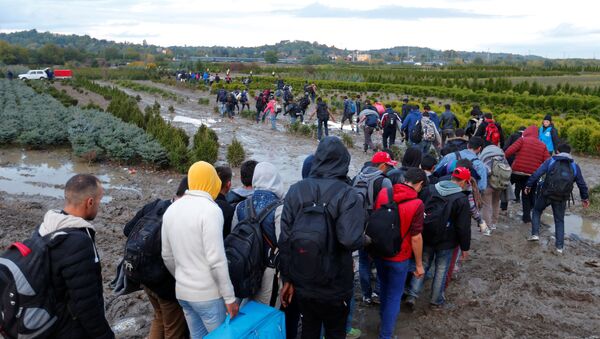Hungary's Minister of State for Government Communication Bence Tuzson warned of the huge costs and financial implications of allowing migrants to settle in the country.
"Based on these plans [EU quotas], Hungary would have to already admit over ten thousand migrants before the end of this year, after which an admittance system with no upper limit would come into being, all of which would have serious financial implications," Minister Tuzson said during a press conference over the weekend.
He then proceeded to outline the costs of settling migrants in Hungary, warning that these costs could rise as there isn't an upper limit on the number of migrants who can settle in the country.
READ MORE: Is This Sparta? This is Asotthalom! Sputnik Patrols Hungarian Border Fence
"In view of the fact that according to Brussels' plans some 9 million forints ($35,500) would have to be spent on providing for each and every migrant, the cost involved would be in the region of 100 billion forints ($395 million), which could further increase by several orders of magnitude in future years at the expense of the national budget," the minister added.
Mr Tuzson used Germany as an example of how migrant spending can skyrocket in a short space of time.
Specifically, he claimed that Germany's spending on migrant welfare and other associated costs increased by over 70 percent in the space of a year, and pointed out that the federal state of Bavaria "currently spends more on migration out of its national budget than on the economy, environmental protection and healthcare put together."
"If Soros's people gain power in Hungary on 8 April [Hungarian parliamentary elections], this same fate will also await Hungary, which the country could not handle, it would go bankrupt, we would have to do without development projects, pension increases and family support schemes," Minister Tuzson warned.
Hungary built a border wall with Serbia and Croatia in 2015, at the peak of the migrant crisis, and has called on the EU to provide reimbursement for the wall's construction. Another border barrier with Serbia, spanning 155 kilometers, was completed last year.
Although most migrants aimed to settle in wealthier EU member states, such as Sweden and Germany, Hungary was still adversely affected by the crisis, as tens of thousands of migrants crossing through the country in 2015 alone to reach other European nations.



